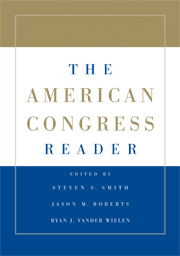Book contents
- Frontmatter
- Contents
- THE AMERICAN CONGRESS READER
- PART I THE AMERICAN CONGRESS: MODERN TRENDS
- PART II REPRESENTATION AND LAWMAKING IN CONGRESS: THE CONSTITUTIONAL AND HISTORICAL CONTEXT
- PART III CONGRESSIONAL ELECTIONS AND POLICY ALIGNMENTS
- PART IV MEMBERS, GOALS, RESOURCES, AND STRATEGIES
- 11 Senate Representation and Coalition Building in Distributive Politics
- 12 Risk-Bearing and Progressive Ambition
- 13 Issue Politics in Congress – Excerpts
- PART V PARTIES AND LEADERS
- PART VI THE STANDING COMMITTEES
- PART VII THE RULES OF THE LEGISLATIVE GAME
- PART VIII THE FLOOR AND VOTING
- PART IX CONGRESS AND THE PRESIDENT
- PART X CONGRESS AND THE COURTS
- PART XI CONGRESS, LOBBYISTS, AND INTEREST GROUPS
- PART XII CONGRESS AND BUDGET POLITICS
- PART XIII FURTHER READINGS ON CONGRESSIONAL POLITICS
13 - Issue Politics in Congress – Excerpts
Published online by Cambridge University Press: 05 June 2012
- Frontmatter
- Contents
- THE AMERICAN CONGRESS READER
- PART I THE AMERICAN CONGRESS: MODERN TRENDS
- PART II REPRESENTATION AND LAWMAKING IN CONGRESS: THE CONSTITUTIONAL AND HISTORICAL CONTEXT
- PART III CONGRESSIONAL ELECTIONS AND POLICY ALIGNMENTS
- PART IV MEMBERS, GOALS, RESOURCES, AND STRATEGIES
- 11 Senate Representation and Coalition Building in Distributive Politics
- 12 Risk-Bearing and Progressive Ambition
- 13 Issue Politics in Congress – Excerpts
- PART V PARTIES AND LEADERS
- PART VI THE STANDING COMMITTEES
- PART VII THE RULES OF THE LEGISLATIVE GAME
- PART VIII THE FLOOR AND VOTING
- PART IX CONGRESS AND THE PRESIDENT
- PART X CONGRESS AND THE COURTS
- PART XI CONGRESS, LOBBYISTS, AND INTEREST GROUPS
- PART XII CONGRESS AND BUDGET POLITICS
- PART XIII FURTHER READINGS ON CONGRESSIONAL POLITICS
Summary
Sulkin argues who candidates that win congressional elections regularly and systematically assume their challengers priority issues from the preceding campaign and take legislative action on them while in office, a practice she terms “issue uptake.” Campaign winners engage in uptake behavior, according to Sulkin, because they are motivated by reelection. Because challengers focus their criticism on incumbents weaknesses, the issues that challengers center on in campaigns send a valuable signal to winning legislators regarding issue areas they may have previously overlooked.
ELECTORAL CHALLENGES AND LEGISLATIVE RESPONSIVENESS
Going into his first reelection campaign in 1992, Senator Bob Graham was about as secure as any incumbent facing a challenge could hope to be. Though new to the Senate, he had a long history in Florida politics, including many years of service in the state legislature and two terms as governor. Endorsed by a host of newspapers and interest groups, he was described by many as the state's most popular politician, largely as the result of his reputation for action on environmental and economic issues of interest to his constituents. During his active and well-funded campaign, Graham further leveraged these strengths by highlighting his competence and interest in the economy, the environment, and the proper role of governmental regulation.
In contrast, his opponent, Republican representative Bill Grant, faced an even greater uphill battle than most challengers.
- Type
- Chapter
- Information
- The American Congress Reader , pp. 162 - 174Publisher: Cambridge University PressPrint publication year: 2008



